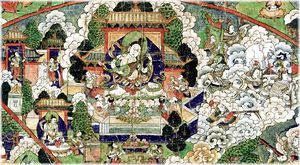Deva
Deva (T. lha ལྷ་; C. tian 天) are one of the six classes of beings within Buddhist cosmology. Translated literally, deva means "radiant one," "shining one," etc.[1] However, this term is commonly translated as "god," "divinity," "heavenly being," "celestial being," etc.[1]
Buddhist cosmology identifies three classes of devas, corresponding to the three realms of existence. These are:
- six types of devas of the kāmadhātu (sensuous domain)
- sixteen (or seventeen) types of devas of the rūpadhātu (domain of subtle form)
- four types of devas of the arūpadhātu (formless domain)
Rebirth as a deva is the result of the accumulation of positive karma from previous lifetimes.[1] The devas live very long lives. However, with the exception of the devas of the five pure abodes, the lives of the devas eventually come to an end, and they must undergo the suffering of death and rebirth.[2]
The devas of the kāmadhātu are one of the eight classes of non-human beings (aṣṭasenā) that attended the Buddha's teaching.[3]
Notes
- ↑ 1.0 1.1 1.2 Buswell & Lopez 2014, s.v. deva.
- ↑ The devas born in the pure abodes "have reached a condition in which they inevitably attain nirvāṇa and so escape the round of rebirth." (Gethin 1998, Chapter 5)
- ↑ Buswell & Lopez 2014, s.v. aṣṭasenā.
Sources
 Buswell, Robert E.; Lopez, Donald S. (2014), The Princeton Dictionary of Buddhism, Princeton University
Buswell, Robert E.; Lopez, Donald S. (2014), The Princeton Dictionary of Buddhism, Princeton University Gethin, Rupert (1998), Foundations of Buddhism, Oxford University Press
Gethin, Rupert (1998), Foundations of Buddhism, Oxford University Press
Further reading
- Third Dzogchen Rinpoche, Great Perfection: Outer and Inner Preliminaries, translated by Cortland Dahl (Snow Lion, 2008), pages 130-134
- Trainor, Kevin (2004). Buddhism: The Illustrated Guide. Oxford: Oxford University Press. ISBN 9780195173987.
- Norman, K. R. (1981). "Devas and Adhidevas in Buddhism," Journal of the Pali Text Society 9, 145-155
 Gods, Rigpa Shedra Wiki
Gods, Rigpa Shedra Wiki
